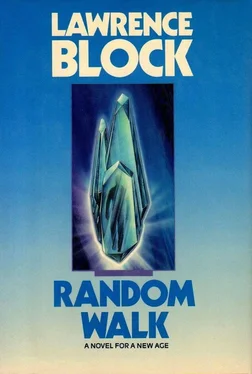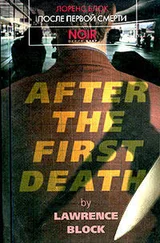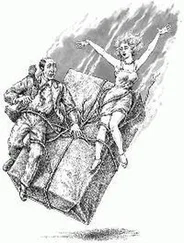But something made her say, “Now do you know what I wish? I wish I could walk just a little ways down the road with you. So that no matter how far you went on without me, I’d still be going with you in spirit.”
“Then that’s what you’ll do, Mame.”
“Oh, I’d slow you down. I can’t do that.”
“You’ll walk with me,” one of them said. His name was Les, she remembered, and he was the biggest of the lot, with a fancy western shirt and an imposing bamboo walking stick. “It don’t matter how slow we go, ma’am. The rest of these folks can go on ahead and I’ll catch up with ’em later. I’ve been holding down my pace to stay with them all morning, and if they get out in front a mile or two it’ll give me a chance to stretch my legs.”
Two of the younger men suggested they could interlock their arms to make a chair and carry her that way. Sara, the blind woman with the beautiful gray eyes, said no, that Mame should walk with Les. But how would she get back when she had gone as far as she wanted to go?
“I’ll walk her back,” he said, “or I’ll carry her back if she’s had enough walking. You people aren’t gonna get that far out in front of me. You’ll stop for lunch, or to look at a mountain, or to dig in the dirt for arrowheads. Mame and I could walk for an hour and I’d still catch up with you by the time you’re ready to make camp for the night.”
“But do you want to do that?” she demanded. “Don’t you want to stay with your friends?”
“Oh, these folks aren’t my friends,” he told her. “They just want me for my money.”
And so they walked together. Her pace was shamefully slow but he didn’t seem to mind in the least. He walked with a rolling gait, so that he seemed to be moving all the time even though he was keeping pace with her. At first it pained her to see the rest of them drawing away from her, but before long they vanished around a bend in the road, and once they were out of sight she was less aware of the widening gap between them. Now she and Les were no longer at the rear and falling ever farther behind; instead, they were off on their own, and keeping up with each other just perfectly.
He spoke some about his business career, and about his marriages. “One was worse than the next,” he said, “and after the last time I swear I never thought I’d do it again, and if I hadn’t been drinking Jack Daniel’s on top of French champagne I wouldn’t have, and surely wouldn’t have picked Georgia to marry. But do you want to know something? I think it might last awhile.”
She talked about her marriage, and her husband’s death. She told how he’d ignored warning signals and broken doctor appointments. “They might have saved him if he went to them on time,” she said, “but he was scared of what they’d find, and so he went and died for fear he might be dying. Damn the man anyway, making me a widow with his damnable cowardice.”
Les said something, but she didn’t even hear him. She was too shocked by her own words and the tone of her own voice. Why, she’d never said anything like that before. She’d never even thought anything like that before.
Or spoke of anyone, least of all Karl, in that tone of voice.
She talked about her daughter, her second-born child, born with a defective valve in her heart, sickly all her life, always a near-invalid, and dead, God rest her, at seventeen.
“And all those years until then,” she said, “she stayed alive but she wasn’t alive. She couldn’t really live, do you know what I mean, Les? She couldn’t run. She couldn’t climb a full flight of stairs. She caught cold all the time, she got weary in the summer’s heat. And I wanted to shout, ‘Go ahead! If you’re not going to live then go ahead and die!’ But of course she didn’t die. And then she did die, and I buried her.”
Was that true? Had she ever wanted Mary Frances to die? No, it couldn’t be true, it was just the excitement of the day, making all manner of unseemly things come popping out of her mouth.
And Les said, “Mame, you don’t have to push yourself. Just walk at a nice easy pace.”
“I’ll take that as a joke, Les.”
“No, I’m serious,” he said. “You’re walking much faster than you did when we first set out.”
“Well, if I am I didn’t realize it,” she said. “I’m certainly not straining. I thought I was going the same snail’s pace as always. Plant the walker, take a step, shift your weight, move the walker. You’re right . I am going faster.”
“I told you.”
“I guess my joints are warming up a little,” she said. “All this activity, and out in the sun and all.”
“Karl was just trying to protect me,” she said. “He thought I couldn’t manage without him. He should have known better than that, but he didn’t. He needed the idea that I needed him. He had to think I wasn’t enough without him, because he thought he wasn’t enough unless he was needed by somebody.” She sighed. “He was a sweet man. He didn’t dare believe he had cancer. He tried to fight it by closing his eyes to it, and then it was too late.”
And, a little later, “Why did Alan have to move to Washington? What was so wonderful about him that he deserved a better life than his mother and father had? What made him too good for his home, too good for his family? Why, he even came to discover he was too good for his wife, and so he had to leave Ruth and marry the new one, Stephanie.”
And, after that, “I couldn’t bear knowing I would lose Mary Frances someday. I loved her so much I couldn’t stand the idea. And so I wanted her to hurry up and die and get it over with, but I was afraid to want that, so I cut off the feeling, and by doing that I held back some of the love, because I was afraid to love her as much as I did.”
And, finally, “Les, do you want to know what the real story is about me? I just always wanted to hold onto everything. I couldn’t bear to let go of a thing. I was always afraid people would leave me and I’d be the less for it. Why, these past years, staying on in that house. Les, I was trying to hold onto those mountains.”
“They’re fine mountains, Mame.”
“Well, they’re fine without me, and I’ll be fine without them. I swear I’m all of a sudden seeing things faster than I can fit words to the tune of them. Les, do you need that stick?”
“Pardon?”
“That bamboo cane, that stick of yours. Do you need it to walk?”
“Oh, hell, no,” he said. “I thought I might when I bought it, but I mostly picked it up because it struck me as a handsome piece of workmanship. There’s not a great deal you’d admire to purchase in Bend. Why?”
“Could you take this metal frame away from me, and just let me try your stick for a little while?”
“You think you’ll be all right with it?”
“I think I’ll be fine with it. I know I’ll be fine with it.”
It was just the most remarkable thing.
She never seemed to be hurrying, because as the arthritis withdrew she went on putting the same amount of effort into her walking, and it kept producing greater results. Her body straightened, her stride lengthened, her step quickened, and she simply could not believe what was happening to her.
Except that she could believe it, she had to be able to believe it, or else how in the world could it happen? Because there were moments when she fastened on that thought — I can’t believe this — and then she would feel something seize up inside of her, something curled within her bones, and she would begin to give back a little of what she had gained. Somehow she knew that she couldn’t have this unless she was prepared to believe it, and so she willed that belief into her bones and breathed deeply to fuel herself and kept those feet moving.
Читать дальше








